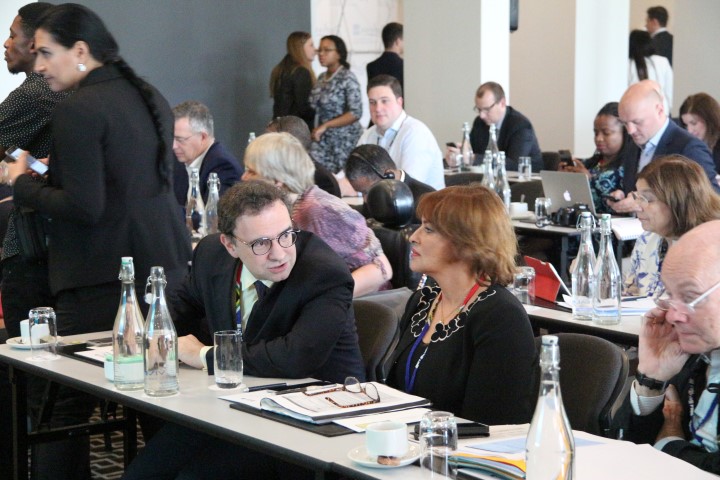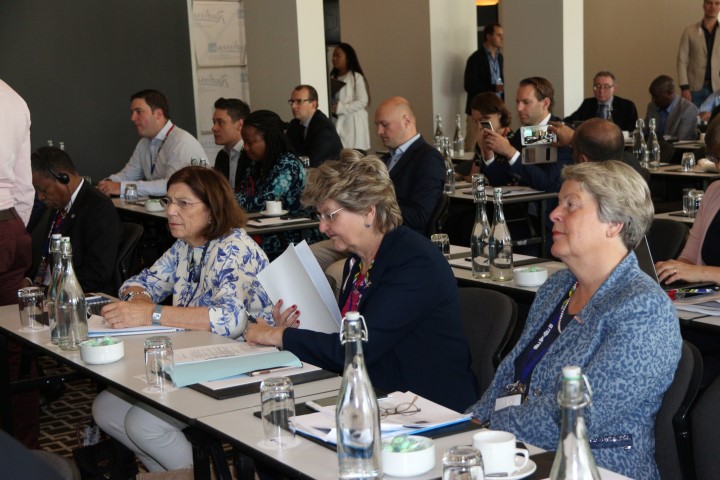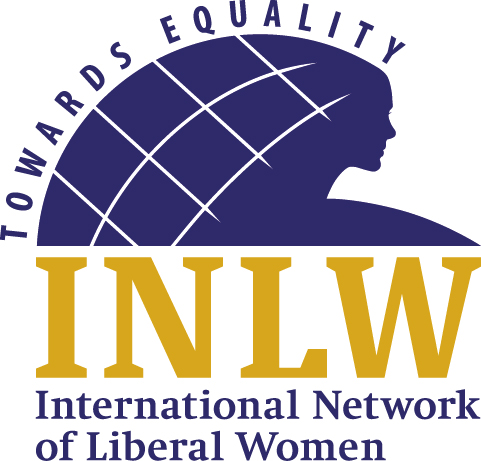INLW submitted a resolution during this Committee Meeting:

 “More Women in Local, Regional, National and International Policy Making for Good Governance Worldwide” which subsequently adopted by the meeting.
“More Women in Local, Regional, National and International Policy Making for Good Governance Worldwide” which subsequently adopted by the meeting.
Noting that:
CALD Women’s Caucus Chair Ms. Jayanthi Balaguru on 12-08-17 in her closing speech of the Women’s Caucus of the Council of Asian Liberals and Democrats Conference called on CALD member-parties to ensure that a “Gender Equality Law” is passed in their respective countries.
At the Conference, Taiwan’s first female President Tsai Ing-wen said: “Taiwan’s journey toward women’s empowerment shows that promoting gender equality reinforces democratic and progressive values”. Former Vice-President Annette Lu who was characterized as “an indispensable driving force in Taiwan’s democratization”, said: “with feminism and soft power, women’s leadership can change the world for the better. Women shall be determined to lead their family, society and world towards a better future. Women shall make mission impossible into mission possible!”
Lu went on to say:
“It is time for the Feminization of power, where half or more of those involved in politics, economic and social development are women. We should learn and apply ‘Soft Power’, which is constructive and generous, to face the unprecedented and multiple challenges coming our way, instead of applying the ‘Hard Power’ traditionally used, which is destructive and exploitative by nature.”
“The 21st Century is the ‘She Century’, whereby the ‘Soft Power’ is used instead of or next to ‘Hard Power’.
And ‘She-Economy’ indicates Women are now making 85% of consumer choices and millions are entering the job market creating work and rising GDP’s.
And ‘She-Society’ should be Women taking an equal part in handling the crisis of war and terrorism, poverty and natural disasters.”
Liberal International calls upon Member Parties and their Governments to:
Implement equal rights for women and men in all political decisions.
Ensure women and men participate equally at all levels of peace processes, conflict prevention, conflict resolution and peace building in accordance with UNSC Resolution 1325.
Ensure women are involved in decisions on Environment and Ecology.
Recognize ‘Soft Power’ as a force to change the world and face the unprecedented, multiple challenges coming our way.
Educate women and men to apply the wisdom of ‘Soft Power’ including democracy, human rights, culture, love, peace, technological innovation, environmental protection and ecology.
integrate Gender equality in all targets and apply Gender equality in National, Regional and Local Agendas so that by increased Feminization and Soft Power, the ‘She-Century’ can lead to Good Governance and to a better world.
This resolution contributes to the discussion that was held at the Conference and which was concluded with the adoption of the “Johannesburg Declaration on better Governance”
With regards to:
- the Andorra Manifesto 2017 of Liberal International
- the resolution adopted at the 51st Congress in Budapest 2002: Good Governance – a liberal view
- the relevant international Conventions on protection of human rights
- the Principles relating to the Status of National Institutions ( The Paris Principles) adopted by the UN General Assembly in resolution 48/134 of 20.12.1993
- the obligations of the Sustainable Development Goals, SDGs, binding every member state of the United Nations
- the State of the Worlds’ Population 2018
- the recent academic joint study of the UN and the World Bank; Pathways to Peace, Inclusive Approaches to preventing violent conflict
Emphasising that, in the Andorra Manifesto, we liberals commit ourselves to a vision of human progress in a free world where:
- freedom of every human being is an essential principle in achieving human progress and a better world
- institutions are democratic, accountable and capable, they can provide equal rights and freedoms for all, and human creativity can flourish and fuel human progress towards a peaceful, prosperous and open global society
- improving health standards and providing access to health care for everybody must be an ambition and primary objective for all national governments and the international community.
- providing a high-quality education to all irrespective of background is the best guarantor of equality of opportunity,
Thus, it is important for us to define how we can achieve the Better Governance we seek as a precondition for such an inclusive and sustainable society.
Noting however:
- that more violent conflicts occur now than ever during the past 30 years, making societies vulnerable and thus creating big obstacles for achieving the SDGs and for human progres
- that authoritarian rule is resurgent and, consequentially, fewer citizens can make free choices or realise their full potential
- that clientelism has spread in many countries calling themselves democracies, which means that many citizens are deprived of opportunities
- that millions of people have been lifted from poverty through globalisation, spreading of technology and more free trade, however in many societies the gap between rich and poor has widened
Basic Building Blocks for Better Governance:
- Rule of law, democracy, promotion of an active civil society and respect for human rights, including equality of all citizens, are preconditions for Better Governance and combatting discrimination
- Better governance also means that women and men have equal opportunities, including the right to ownership and entrepreneurship, that the needs of future generations are taken on board, that sustainable development is prioritised, and that degradation of the ecosystems is avoided
Rule of Law:
- is a precondition for building trust in society, both among citizens and between citizens and the authorities at different levels
- includes the notion that the laws of a country respect fundamental human rights
- means that the authorities are equally bound by law as all other entities in the society – power can be exercised only when there is legal authority and in accordance with the way the law describes it
- nobody is above the law and politicians are especially bound by these principles and are thus not allowed to distribute benefits or grant favour without legal authority
- exists only when the independence of the judiciary and the separation of powers between the executive, the legislative and the judiciary are in place
- includes access to justice for those who need, fair trials and not excessively lengthy procedures
- is one of the best remedies against corruption and also a way of creating an investment friendly environment
- the Aarhus convention of UNECE is a good example of the transparency needed in public decisions on environmental affairs as it stresses that citizens should have the right to get a wide and easy access to information on public projects relevant for the environment
Human Rights:
- states must recognise and deliver on their commitments to international instruments and conventions on human rights; human rights must be given priority in national constitutions and legal systems
- countries must accept the authority of international monitoring bodies and cooperate with the mechanisms they have signed up to
- independent national human rights institutions, according to the so called Paris Principles, are important at implementing the obligations on human rights and giving priority to human rights education
- the freedom of the freedom of association and assembly and the protection of human rights defenders must be given priority by countries who respect international norms and wish to promote the universal application of them
- the freedom of the media, including the safety of journalists to carry out their work must be guaranteed
- condemn all human rights abuses wherever they occur
Democracy:
Better governance or rule of law cannot exist without a functioning, liberal democracy that is able to defend itself. Preconditions for a true, inclusive democracy are among others:
- freedom of speech, assembly and association
- a free and fair competition between political parties, fair access to mass media
- independent electoral commissions and the possibility to challenge their decisions in an effective way in Courts
- political parties which have democratic procedures for decision making
- transparency of financing of political parties and of electoral campaigns
- an electoral system that does not lead to exclusion of groups in society and does not give excessive rights to stronger political parties
- an independent and free civil society
- strong civic education to equip civil society to better defend itself against fake news and cyber attacks
In a strong democracy, parliaments have effective control over government and have instruments to hold the executive accountable. Administrative resources are not used for political campaigning.
All countries must be open for international, independent and long-term monitoring of elections according to the best international standards.
When human rights are respected, a true democracy is in place and the rule of law is enshrined not only in law but in practice, good and better governance can prosper in the interest of the whole society, aiming at freeing the potential of all citizens and caring for the prosperity of future generations.
Better Administration – the opposite of maladministration:
- In a well governed society the subsidiarity principle implies that decisions are made at an appropriate level and as close to the citizens as possible, meaning that the principle of decentralisation is working.
- Transparent decision making, access to information and protection of whistle-blowers who reveal maladministration are necessary. Access to information for all citizens and media on all phases of procurement processes, with the exception of business secrets, is a very good way to combat corruption and nepotism. Removal of unnecessary red tape, for instance of diverse permits, helps in combatting corruption and maladministration.
- Better governance means a public administration based on predictability and equal treatment. Clear and well defined rules outlining when conflicts of interest occur are needed, and in such situations decision-makers should avoid active involvement in public administration matters. Such rules should be widely published.
- Efforts to make decisions of public bodies as understandable as possible for all citizens is both creating better administration and more democratic societies and will in save resources.
- There should be a general obligation of public servants to give information when requested but also on their own initiative. The impetus should always be to inform the citizens if they have turned to the wrong authority.
- When the public sector, and also Liberal parties, are employing people this should happen on merit; rules for avoiding cadre employment, nepotism and conflicts of interest should be applied.
- When tasks are transferred to public companies the same principles of transparency should as far as possible be the rule.
Basic principles for financing of the public sector:
- The state budget should contain diversified forms of income that are due to the state; including taxes, and non-tax sources ( royalties, licenses, levies or other income for example from natural resources owned by the state) and all kind of sales of common property. Taxes and tariffs should have a basis in the legislation. Funds can be created under special circumstances.
- Tax administrations should be strengthened to broaden the tax base where appropriate, close loopholes and to effectively address tax avoidance, tax evasion and illicit financial flows.
- Parliaments must have oversight over the income that derives from international donors or development organisations, to ensure that these revenues and benefits are distributed according to objective criteria and not only to support the governing party/ parties.
- When tasks are decentralised, it should be ensured that the new stakeholders have reasonable resources to care for these new tasks. Unfunded decentralisation is detrimental to public trust in democracy.
- Governments cannot rely on future generations to pay for current expenditures and democracy should not be degraded via unaffordable debt-based public spending.
- Good public expenditure management, improving the value for money, the transparency and accountability of public expenditure, increases the fiscal space and enables governments to provide better public goods and services. There is often need for a review of subsidy programmes that are ill-targeted and ineffective and distort the market, such as for example environmentally harmful fossil fuel subsidies, preventing renewable energy sources from becoming viable and competitive.

 Visit our Facebook page
Visit our Facebook page